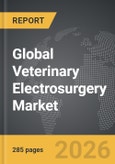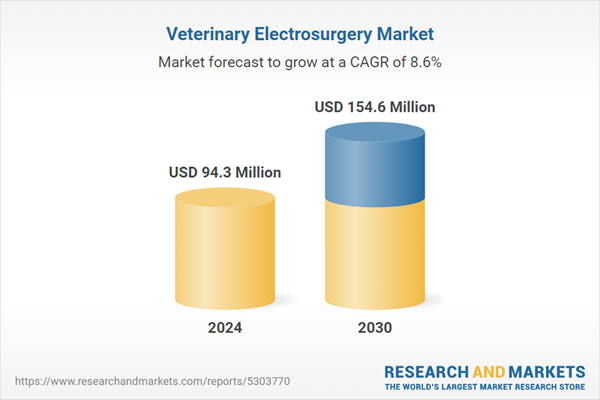Global Veterinary Electrosurgery Market - Key Trends & Drivers Summarized
What Is Veterinary Electrosurgery, and Why Is It So Crucial in Animal Healthcare?
Veterinary Electrosurgery involves the use of high-frequency electrical currents to cut, coagulate, desiccate, or fulgurate tissues during surgical procedures on animals. It is commonly employed in soft-tissue surgeries, tumor removal, dental procedures, spaying/neutering, and other surgical interventions for pets, livestock, and exotic animals. Electrosurgical devices include tools like electrodes, electrocautery probes, bipolar and monopolar instruments, and surgical generators, all designed to offer precision, reduce blood loss, and enhance surgical outcomes.The importance of veterinary electrosurgery lies in its ability to offer quicker, safer, and more efficient surgeries. By enabling precise incisions and coagulation with minimal blood loss, electrosurgery reduces the risk of infection, shortens surgical time, and improves recovery for animals. This technology is particularly valuable in soft-tissue surgeries, where rapid coagulation is critical to maintaining the animal's stability. As demand for advanced veterinary care grows globally, veterinary electrosurgery has become a vital tool for veterinarians seeking to provide high-quality and minimally invasive treatments, improving outcomes and increasing the success rate of surgeries in animal healthcare.
How Are Technological Advancements Shaping the Veterinary Electrosurgery Market?
Technological advancements have significantly improved the precision, safety, and effectiveness of Veterinary Electrosurgery, driving innovation across various veterinary procedures. One of the major developments is the rise of bipolar and monopolar electrosurgical devices, which allow for greater flexibility and accuracy during surgeries. Bipolar electrosurgery, in particular, has become popular for its precision and reduced collateral damage to surrounding tissues, making it ideal for delicate surgeries in smaller animals or specific organ systems. Monopolar devices, on the other hand, are effective for larger incisions and extensive tissue cutting, offering versatility in complex procedures.Advancements in electrosurgical generators have enhanced control over power settings, frequency modulation, and energy output, enabling veterinarians to perform a wider range of surgical procedures with greater precision. Modern electrosurgical generators are equipped with digital displays, allowing veterinarians to adjust settings quickly based on the animal's size, tissue type, and surgical requirements. These generators now feature safety mechanisms such as automatic power shutoff and real-time monitoring, which reduce the risk of thermal injury and ensure safer operations.
The integration of electrosurgery with other minimally invasive technologies, such as endoscopy and laparoscopy, has expanded the applications of veterinary electrosurgery. Electrosurgical tools designed for endoscopic procedures enable veterinarians to perform precise cuts, coagulations, and biopsies within body cavities, offering less invasive alternatives to open surgeries. Additionally, the development of single-use, sterile electrosurgical instruments has improved hygiene and safety, reducing the risk of cross-contamination and enhancing surgical outcomes. These technological innovations not only expand the capabilities of veterinary electrosurgery but also align with broader trends toward safer, more efficient, and less invasive animal healthcare solutions.
What Are the Emerging Applications of Veterinary Electrosurgery Across Different Types of Animals and Procedures?
Veterinary Electrosurgery is finding expanding applications across a variety of animal species and procedures, driven by the need for effective and minimally invasive treatments in diverse veterinary settings. In companion animal care, electrosurgery is commonly used for routine soft-tissue surgeries, including spaying and neutering, tumor removal, skin lesion treatment, and dental procedures. It offers faster recovery times, reduced post-operative pain, and minimal blood loss, making it the preferred choice for pet owners seeking high-quality surgical care. Electrosurgical tools are also used in ophthalmic procedures, where precision is critical for delicate tissues around the eyes.In equine and livestock care, veterinary electrosurgery is used for large-animal surgeries, including castrations, tumor excisions, and wound management. Bipolar electrosurgery, which minimizes thermal damage, is especially useful for controlling bleeding in thick tissues, improving surgical outcomes for larger animals like horses and cattle. Electrosurgery is also employed in reproductive surgeries, such as cesarean sections and uterine repairs, where quick coagulation and minimal bleeding are essential for animal survival.
In exotic animal and wildlife medicine, where surgical procedures are often complicated by the animal's small size or unique physiology, veterinary electrosurgery provides the precision required for successful outcomes. The versatility of electrosurgical tools, including their ability to adapt to laparoscopic and endoscopic procedures, allows veterinarians to treat internal conditions in reptiles, birds, and small mammals with minimal invasion. The expanding applications of veterinary electrosurgery across these diverse animal types and procedures highlight its critical role in modern veterinary practice, supporting better outcomes and higher standards of animal care.
What Drives Growth in the Veterinary Electrosurgery Market?
The growth in the Veterinary Electrosurgery market is driven by several factors, including increasing pet ownership, rising demand for advanced veterinary care, and the development of safer, more efficient surgical tools. One of the primary growth drivers is the growing number of companion animals globally, fueled by rising disposable incomes, changing lifestyles, and increased awareness of animal welfare. As pet owners seek better healthcare solutions for their pets, the demand for advanced surgical techniques, including electrosurgery, has surged, prompting veterinary clinics and hospitals to adopt electrosurgical devices to offer high-quality care.The increasing prevalence of veterinary diseases, injuries, and age-related conditions among pets, livestock, and exotic animals has further fueled the demand for electrosurgery. Conditions such as tumors, reproductive issues, and dental diseases often require surgical intervention, making electrosurgical tools essential for efficient treatment. The adoption of minimally invasive surgeries, which reduce recovery times and post-operative complications, has encouraged the use of electrosurgical devices in both routine and complex procedures.
Technological innovations, such as improved electrosurgical generators, bipolar and monopolar devices, and integration with endoscopic tools, have expanded the scope of veterinary electrosurgery, making it more accessible and effective. Regulatory support for improved animal welfare and surgical safety standards has also contributed to market growth. Government initiatives and veterinary associations promoting the use of safer and more efficient surgical technologies have encouraged clinics to upgrade their equipment, driving demand for advanced electrosurgical systems. With ongoing innovations in device safety, precision, and versatility, the Veterinary Electrosurgery market is poised for robust growth, supported by global trends toward better animal healthcare, increased pet ownership, and higher demand for minimally invasive veterinary procedures.
Report Scope
The report analyzes the Veterinary Electrosurgery market, presented in terms of market value (US$ Thousand). The analysis covers the key segments and geographic regions outlined below.- Segments: Product (Bipolar Electrosurgery Instruments, Monopolar Electrosurgery Instruments, Consumables & Accessories); Application (General Surgery, Gynecological & Urological Surgery, Dental Surgery, Orthopedic Surgery, Other Applications).
- Geographic Regions/Countries:World; United States; Canada; Japan; China; Europe (France; Germany; Italy; United Kingdom; Spain; Russia; and Rest of Europe); Asia-Pacific (Australia; India; South Korea; and Rest of Asia-Pacific); Latin America (Argentina; Brazil; Mexico; and Rest of Latin America); Middle East (Iran; Israel; Saudi Arabia; United Arab Emirates; and Rest of Middle East); and Africa.
Key Insights:
- Market Growth: Understand the significant growth trajectory of the Bipolar Electrosurgery Instruments segment, which is expected to reach US$74.4 Million by 2030 with a CAGR of a 9.2%. The Monopolar Electrosurgery Instruments segment is also set to grow at 7.6% CAGR over the analysis period.
- Regional Analysis: Gain insights into the U.S. market, valued at $24.4 Million in 2024, and China, forecasted to grow at an impressive 12.5% CAGR to reach $38.6 Million by 2030. Discover growth trends in other key regions, including Japan, Canada, Germany, and the Asia-Pacific.
Why You Should Buy This Report:
- Detailed Market Analysis: Access a thorough analysis of the Global Veterinary Electrosurgery Market, covering all major geographic regions and market segments.
- Competitive Insights: Get an overview of the competitive landscape, including the market presence of major players across different geographies.
- Future Trends and Drivers: Understand the key trends and drivers shaping the future of the Global Veterinary Electrosurgery Market.
- Actionable Insights: Benefit from actionable insights that can help you identify new revenue opportunities and make strategic business decisions.
Key Questions Answered:
- How is the Global Veterinary Electrosurgery Market expected to evolve by 2030?
- What are the main drivers and restraints affecting the market?
- Which market segments will grow the most over the forecast period?
- How will market shares for different regions and segments change by 2030?
- Who are the leading players in the market, and what are their prospects?
Report Features:
- Comprehensive Market Data: Independent analysis of annual sales and market forecasts in US$ Million from 2024 to 2030.
- In-Depth Regional Analysis: Detailed insights into key markets, including the U.S., China, Japan, Canada, Europe, Asia-Pacific, Latin America, Middle East, and Africa.
- Company Profiles: Coverage of players such as B. Braun Melsungen AG, Burtons Medical Equipment, Ltd., Covetrus, Inc., Dre Veterinary, Eickemeyer Veterinary Equipment, Inc. and more.
- Complimentary Updates: Receive free report updates for one year to keep you informed of the latest market developments.
Some of the 42 companies featured in this Veterinary Electrosurgery market report include:
- B. Braun Melsungen AG
- Burtons Medical Equipment, Ltd.
- Covetrus, Inc.
- Dre Veterinary
- Eickemeyer Veterinary Equipment, Inc.
- Integra Lifesciences Holdings Corporation
- Keebovet Veterinary Ultrasound Equipment
- Kwanza Veterinary
- Led Spa
- Medtronic PLC
This edition integrates the latest global trade and economic shifts into comprehensive market analysis. Key updates include:
- Tariff and Trade Impact: Insights into global tariff negotiations across 180+ countries, with analysis of supply chain turbulence, sourcing disruptions, and geographic realignment. Special focus on 2025 as a pivotal year for trade tensions, including updated perspectives on the Trump-era tariffs.
- Adjusted Forecasts and Analytics: Revised global and regional market forecasts through 2030, incorporating tariff effects, economic uncertainty, and structural changes in globalization. Includes historical analysis from 2015 to 2023.
- Strategic Market Dynamics: Evaluation of revised market prospects, regional outlooks, and key economic indicators such as population and urbanization trends.
- Innovation & Technology Trends: Latest developments in product and process innovation, emerging technologies, and key industry drivers shaping the competitive landscape.
- Competitive Intelligence: Updated global market share estimates for 2025, competitive positioning of major players (Strong/Active/Niche/Trivial), and refined focus on leading global brands and core players.
- Expert Insight & Commentary: Strategic analysis from economists, trade experts, and domain specialists to contextualize market shifts and identify emerging opportunities.
Table of Contents
Companies Mentioned (Partial List)
A selection of companies mentioned in this report includes, but is not limited to:
- B. Braun Melsungen AG
- Burtons Medical Equipment, Ltd.
- Covetrus, Inc.
- Dre Veterinary
- Eickemeyer Veterinary Equipment, Inc.
- Integra Lifesciences Holdings Corporation
- Keebovet Veterinary Ultrasound Equipment
- Kwanza Veterinary
- Led Spa
- Medtronic PLC
Table Information
| Report Attribute | Details |
|---|---|
| No. of Pages | 285 |
| Published | January 2026 |
| Forecast Period | 2024 - 2030 |
| Estimated Market Value ( USD | $ 94.3 Million |
| Forecasted Market Value ( USD | $ 154.6 Million |
| Compound Annual Growth Rate | 8.6% |
| Regions Covered | Global |









